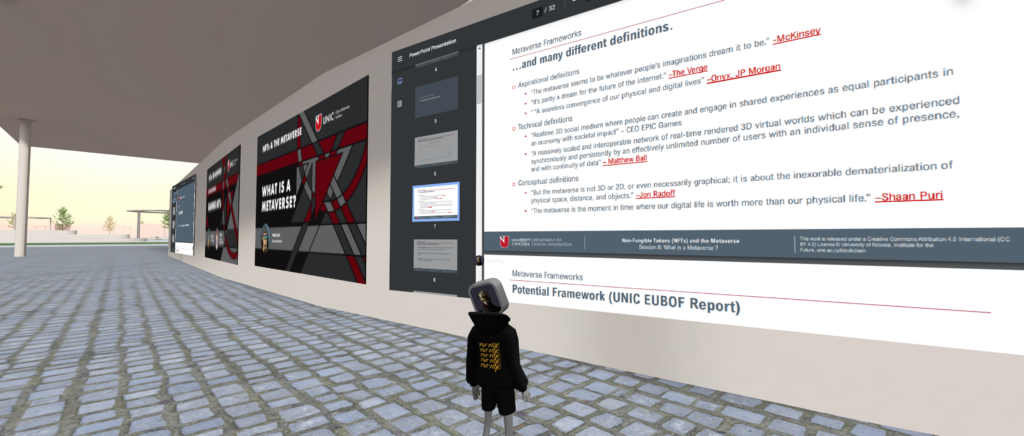W hat is the Metaverse? Understanding Web3(D)
The metaverse (not to be confused with the multiverse, which refers to the concept of alternate/parallel realities) is a term you’re likely to have heard by now. Addressing the question “what is the metaverse,” however, opens an entirely different can of cricket soup.
Complex as the topic is, it’s a can worth opening — so let’s ~pop~ it open with a quiz.
Which of the following is true:
A) There is more than one metaverse platform — some of which you can access now, from a browser, without additional hardware requirements or software downloads (just like the rest of the Internet).
B) “Metaverse” is a term coined by author Neal Stephenson in his 1992 science-fiction dystopia novel Snow Crash, depicting a bleak virtual-reality-based future for the Internet.
C) The “metaverse” does not necessarily require or indicate a virtual reality component.
D) “Metaverse” is a term that countless publicly traded companies and web3 projects alike misused near the end of the 2021 bull market to capitalize on positive buzz for the term (despite having little of real substance developed), which severely damaged the term “metaverse” in the public eye.
E) All of the above.
Click on the cube below and move it around — the corresponding letter in light blue indicates the correct answer.
Like its (somewhat otherwise unrelated, yet often confused) cousin “multiverse,” the metaverse occupies many different realities of definition and platform; in short, you’re likely to get a different answer depending who you ask — and all of those answers could technically be correct — even if one seems to counter the other.
Confused yet? Yes.
During the fall of 2022, notable anonymous technology and art patron Punk6529 (and key proponent of the concept of an “Open Metaverse”) held an in-metaverse series of courses with the University of Nicosia, centered around Non-Fungible Tokens (NFTs — a definition marred by similar confusion and misconception).
Given the frequent association of NFTs with the metaverse, one of the week’s lectures tackled the question of “What is a Metaverse?” in-metaverse:

Having trouble reading the (many) definitions displayed in the screenshot above? Just click the image — it will take you to the same spot in another browser tab where you can read that week’s presentation on the metaverse, while in a metaverse.
To simplify the concept further (and try to distill countless definitions into one), the most concise response to the question of “what is the metaverse” that I’ve heard yet came from a conversation I had with the MetaArchitects HUB founder earlier this year:
“Metaverse is just the Internet in 3D.”
This is, of course, not an end-to-end definition (as it doesn’t cover interoperability and blockchain, or the 2D metaverse platforms, or the AR/MR/XR/VR intersections), but it is one of the easier onramps to understanding “the metaverse” on a conceptual level.
If the concept of the metaverse is accepted as being defined (in part) as “the Internet in 3D,” that means it’s a part of the Internet which already exists — which is accurate — and the Internet that will exists (which is also accurate).
This is exactly why “metaverse” development right now — not someday in the future “when it’s ready” — is so important:
If everyone sits back while only the existing “web2” mega-corporations (ie. Faceboo– sorry, “Meta”) fund and build the metaverse(s), then those will be the only ecosystems to build in. This is objectively Not Good for countless reasons — with the impact on the web developers of the future being Very Not Good, as demonstrated in early 2022 when news of Meta’s metaverse monetization plans broke:

While this nightmare scenario may not be the current reality (there are conflicting reports on the continued development of Meta’s metaverse after widely mocked demos and more than $20 billion logged in losses in the company’s earning reports), it’s more probable than improbable.
Facebook’s 47.5% total projected cut isn’t much higher than what the Apple Store charges apps at 30% — and with the announcement of the Apple Vision Pro earlier this year, it’s clear that the opposing tech behemoth is currently building its own walled garden, which aims to merge AR and VR into its own metaverse — if not necessarily in name.
While this nightmare scenario may not be the current reality (there are conflicting reports on the continued development of Facebook’s “Meta”verse after widely mocked demos and more than $20 billion logged in losses in the company’s earning reports), it’s more probable than improbable:
Facebook’s 47.5% total projected cut isn’t much higher than what the Apple Store charges apps at 30% — and with the announcement of the Apple Vision Pro earlier this year, it’s clear that the opposing tech behemoth is currently building its own walled garden, which aims to merge AR and VR into its own metaverse — if not necessarily in name.
Don’t forget Apple’s touted partnership with Unity, or Unity’s own “47.5%”-esque pricing model change that would have had the potential to charge developers retroactively on a per-install basis (partially walked back after widespread protest — at least on the retroactive front; other criticized points remain).
The term “metaverse” might be out of vogue, but the concept behind it is very much alive — and Apple’s major move into the sector is prime evidence that the “metaverse” (whether you call it that or not) affects the future of all who use the Internet — which includes you, dear reader.
To recap, let’s try another quiz:
What is the Metaverse? The Metaverse is:
- A) Part of the same Internet you’re using right now — just in 3D.
- B) Singular in concept, plural in platform; there is no single “metaverse platform” (despite what Facebook would like you to believe with its rebrand to “Meta”). At the same time, “the metaverse” itself is a series of diverse web technology layers, continually in development, and evolving over time, spanning different platforms, file formats, and technologies.
- C) Not necessarily dependent on VR, AR/XR/MR, or blockchain technology.
- D) An essential component of the future of the Internet, no matter what you call it, or how you define it — making it incredibly important to develop for now, not later.
- E) All of the above.
Still not clicking? Let’s try a more direct example:
So? How about now?

